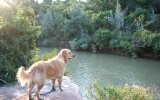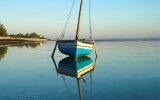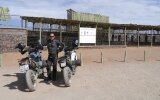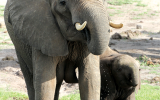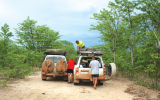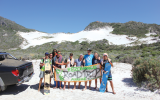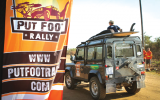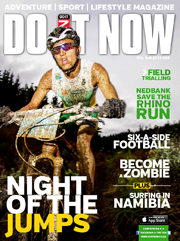- Magazine
- #readityourway
- Weekly Stories
- #shareyourstory
-
Adventure
- Abroad Travelling
- Africa Travelling
- Events
- Expos & Shows
- Festivals
- Fishing
- Free Diving
- Gliding
- Horse Riding
- Inspiring People
- Islands Travelling
- Kite/Windsurfing
- Motorbiking
- Motorised Water Sports
- Mountaineering
- Mountain Biking
- Off-road 4x4
- Off-road Motorbiking
- Paddling
- Performance Driving
- Photography
- Rock Climbing
- Rollerblading
- Sailing
- Scuba Diving
- Skateboarding
- Skydiving
- Snowboarding & Skiing
- Surfing
- Swimming
- Trail Running
- Wakeboarding
- Waveski Surfing
-
Sport
- Adventure Racing
- Fishing
- Free Diving
- Gliding
- Health & Fitness
- Horse Riding
- Inspiring People
- Kite/Windsurfing
- MMA
- Motorbiking
- Mountain Biking
- Multi-sport
- Off-road 4x4
- Off-road Motorbiking
- Paddling
- Performance Driving
- Photography
- Road Cycling
- Road Running
- Rock Climbing
- Rollerblading
- Sailing
- Scuba Diving
- Skateboarding
- Skydiving
- Snowboarding & Skiing
- Surfing
- Swimming
- Rugby
- Trail Running
- Triathlon
- Wakeboarding
- Waveski Surfing
- Lifestyle
- Calendar
The Different Faces of Africa
Words by: Ricolette von Wielligh | Photos by: Ricolette & Hendrik von Wielligh
Category:
Africa Travelling
During the three-and-a-half months and 5,300 km that Hendrik and I have cycled unassisted through Central Africa, we have been exposed to the many faces of Africa; some bad, some good, some happy and some sad. But what has been so memorable for us is the realness of this experience, regardless of the face presented, and with it our love of Africa has deepened. Here are just a few of the incredible encounters we've had on this journey that has been so inspiring and, ultimately, life changing.
My father-in-law appeared dwarf-sized in the distance as I waved goodbye one last time, as we left Namibia and pedalled towards the heart of Africa. Heat waves created mirages on the horizon, mixing acacia shadows with the silhouettes of ostriches, while my bicycle swayed to-and-fro under the weight of my panniers. A truck with Namibian number plate's sped past us, and blinded by a thick cloud of dust that was thrown up in its wake I crashed into Hendrik’s bicycle with a thud. As the cloying dust mingled with my sweat, I wondered if we would return from this journey unharmed.
We cycled eastwards into the Caprivi, the sun's rose-tainted rays dropping below the horizon as it hid itself too soon and left us stranded miles away from the nearest campsite. A neatly thatched kraal across the road caught Hendrik's attention, so he walked over and asked the two teenage boys lounging at the entrance to call the ‘chief’. An old man, bent forward by the years of his age and weight of his wisdom, appeared. His name was Moses. He couldn’t speak English, but he knew the language of kindness and, with the help of the two boys translating, he invited us to stay over at his kraal for the night.
Moses showed us where to set up our tent in the spacious kraal before we took off our sweaty shoes to walk barefoot on the neatly swept white river sand. Having never been inside a kraal before I was not sure what to expect. Possibly unusual sights and smells? But there were none, just the fragrant smell of dancing smoke around a black iron pot, in which porridge and onions cooked. The pot and a few kitchen utensils summed up the total of our host’s earthly possessions. Moses shuffled towards the fire, dragging a green plastic chair for Hendrik to sit on. Then he fetched a chair for me and lastly, one for himself, while his old wife sat on her haunches on the ground next to us. We sat in silence, which was broken by the call of a fiery-necked nightjar in the distance; Good Lord, deliverrr us, Good Lord, deliverrr us. We offered our hosts and their grandsons some suckers, which Moses happily sucked away on for what seemed like the duration of the entire evening, his toothless mouth moulding itself to the orb of sweetness. All the while the two teenage boys talked and laughed next to the camp fire, without a care in the world.
Then Engelbert, the son of Moses, arrived. If I could give him a tribal name it would be Happiness, for his blithe aura filled the kraal and when he laughed his teeth reflected white in the moonlight. He and Hendrik talked long into the night, and in the light of a torch Hendrik showed him on a map the route we intended to cycle: Botswana, Zambia, Malawi, Tanzania. At this point Engelbert shook his head and said, “Tanzania! A-TA-TA-TA!” No matter which country Hendrik pointed to, be it Burundi, Rwanda, Uganda or Kenya, the response from Engelbert was the same, “Tanzania! A-TA-TA-TA! After Engelbert departed, the old mother pulled two corrugated irons in front of the entrance. She slept on the ground next to Moses and the two boys, with only the Milky Way for a blanket. I felt incredibly rich and honoured to have spent the evening with them and experienced their world in which they had blessed us abundantly with the little they had. As I lay in our tent I searched for words to describe my emotions, and this came to mind: Love is simple, uncluttered. It furnishes an empty home.
Since that night we’ve cycled thousands of kilometres, been greeted by countless friendly faces along the way and experienced many more special moments. One such occasion that tweaked at our heart strings was a chance meeting with Berrit, the most beautiful little girl, on our way to the town of Nkhotakota, in Malawi. It happened on one of those beautiful, stress-free days, with people strolling along the main road still kilometres before the town, women carrying huge parcels on their heads, as well as people going about their daily business.
Suddenly Hendrik’s back tyre burst with a loud BANGGG. The next moment people were shouting in panic as they either fell to the ground or dashed for cover, convinced that we were shooting at them. I couldn’t help but smile. Once normality had returned, Hendrik set about changing his tyre beside the road and was instantly surrounded by a crowd of curios children, who studied his every move. Once finished, he asked his captive audience if anyone would like to have the burst tyre. Berrit stepped forward and received the tyre as if she was receiving a treasured prize. However, her moment was short lived when a jealous young boy snatched the tyre out of her hands and walked off without a backward glance. Berrit stood in absolute remorse. Having none of it, Hendrik retrieved the prized possession and gave the tyre back to her. Once again her little face radiated pure joy, and I could tell that she felt very special. I also wondered whether the burst tyre was perhaps the only gift she had ever received?
From Nkhotakota we cycled south along Lake Malawi towards Lilongwe before catching a bus up north to Nkhata Bay. It was a ride that imprinted many 'true to Africa' moments on my mind. The bus was scheduled to leave at 6.30 a.m. from the station, and as we only arrived at 6.20 a.m. we were worried that we were too late. Our concern grew as we looked at the hundreds of people who were already queuing in the long rows in front of us. Luckily our bus had yet to arrive, so we set our watches to 'African time', leaned against our bicycles and waited patiently. The bus finally arrived at 9.30 a.m. We were somewhat taken aback when asked to pay almost double the ticket price we had been quoted on the day before. But thanks to Hendrik's excellent negotiating skills he managed to secure a cheaper price and we hopped into the bus, grateful to be there and find a seat.
Greasy, fingerprinted windows blurred our view and the seats were stacked high with people and oversized luggage, with more people and luggage squashed into the pathway. I curiously watched the process of an old man, sitting at the back of the bus, buy air time from a man, standing in front. The money was passed to the salesman via a trail of hands, before the air time was returned via the same trail of hands. Then there was this big mama, holding a chubby baby and sitting three rows ahead of us, who would pass the gurgling child to her son, who sat two rows behind us on the opposite side of the path, in the same way as the air time transfer was done! And when the baby started to fret, the boy would return the child back to mom, via the helping hands.
Food was traded through the windows at every bus stop, with hands stretched out towards the windows offering soft drinks, bananas or peanuts. Other hands held up boiled eggs and miniscule paper horns filled with salt. It was a crazy but very effective way of doing business. I was thirsty, but didn’t dare drink much fluid for I knew the road to Nkhata Bay could get painfully long. By lunch time the heat and my growing thirst had become unbearable, so at the next stop Hendrik bought me a bottle of water, which I gulped down. I realised too late that it was a used water bottle with a Fanta cap on – so much for mineral water.
At the last stop before Nkhata Bay, we could see a crowd of people waiting for their loved ones to arrive. A joyous, booming sound of laughter caught my attention and amidst the sea of faces I noticed a man who towered above the rest. He was smartly dressed in a bottle green suit, white shirt, and light green tie, the colours complimenting his dark complexion. He became overwhelmed with excitement when 'John' stepped off the bus, and the big man’s body bent backwards in pleasure as he opened his arms wide to embrace him, even though he was still a few metres away. His shouts of, “John, John, John” were intermingled with laughter and tears of happiness. Long arms and big hands finally embraced John, who appeared elf-like in his crushing grip and he held him for a long time, all the while repeating, "John, John, John." Could he be the father of the prodigal son who was returning home, I thought? It was incredibly special to share in his joy.
Our travels were also a culinary journey, where we sampled many (unusual) local dishes and delicacies. While strolling up a steep hill towards the Batawali Forest, at Nkhata Bay, the smell of fermenting mangoes hung heavy in the air from the ripe, luscious orange-yellow mangoes that lay scattered on the ground. They looked so delicious that Hendrik couldn't resist and stopped to pick one up. His action didn’t go unnoticed and a grandmother sitting nearby took a long stick and slapped more mangoes from a tree to give to him. He wasted no time in peeling the mango, slurpy smiles reflecting his gratitude. Soon the grandchildren had brought us chairs to sit on, obeying orders from their grandfather, a hospitable old man with strict house rules. A bowl of water to wash our hands in was also provided by the thoughtful grandmother. As our teeth sunk into the juicy flesh of the mangoes the kids were told to sit down under a tree, a few metres away from us. They immediately obeyed and were soon joined by their elders, and even the dog. I taught the children to say ‘lekker’, pointing to the mangoes and soon they chorused ‘lekkerrrrr’. A little girl took a photo of us eating mangoes, but on play back I realised that she hasn’t mastered Photography 101 yet, as our faces were cut off in the picture.
On seeing cassava (most commonly associated with tapioca) cooking away on the fire, next to a pot of mushrooms, Hendrik asked the grandmother if he could taste it. The granny proceeded to dish it all up, as well as most of the mushrooms, and put it down in front of us to eat. Her generosity put me to shame. The food was bursting with flavour, but how could we eat a poor family’s lunch? So we thanked her, said goodbye and gave her money as a of our appreciation. In retrospect, having given money to her seems so superficial, for how can idle money ever be as valuable as loving kindness towards a stranger?
Next we cycled across the Great Rift Valley and over many challenging hills and mountains, which tapped our energy levels like water running down a drain. Our bodies craved food, as a desert craves water. And then we found our oasis. Exhausted and famished, we headed inside a one-room restaurant at Chisenga just as a thunderstorm broke loose. With the rain pouring down, I was grateful to have a roof over my head, despite a crowd of curious faces spying on us through the window. As we sat down, my eyes wandered over the deteriorated furniture and took in the old cloths that hung from the roof, decorating the walls. Yet everything was spotlessly clean. A man to our right devoured a plate of chicken, which smelt really good, but his loud-mouthed chewing put us off. Instead we ordered maize porridge (sima), eggs and tea. Hendrik’s food was served first, along with a fork. When my food arrived it was without a fork, so I asked the lady serving us for one. “We only have one fork in the restaurant,” she replied, and brought me a spoon. I hadn't meant to embarrass her, and didn’t mind eating with a spoon either - even though it bent double every time I scooped up the sima.
Back on the road and after conquering many more uphills, we passed a group of children who became very excited by our presence. Some shouted greetings, jumping up and down, while others shouted English phrases they had probably learnt at school. A boy of about four, who only had one eye, ran alongside Hendrik and shouted, “Will you marry me?”
Thinking back on this incredible journey, I will lie if I say I never been worried about our safety. With Grace from Above, and so many kind angels sent along our way, we survived the trip unharmed. Africa may be a dark continent, but at least in some places its people radiate love and kindness towards each other, as well as to strangers. I can’t wait to meet another of Africa’s angels …
|
|
|
|
|
|
|
|
|
|
|
|
|
|
|
|

